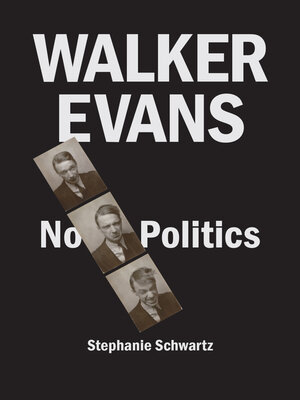
Sign up to save your library
With an OverDrive account, you can save your favorite libraries for at-a-glance information about availability. Find out more about OverDrive accounts.
Find this title in Libby, the library reading app by OverDrive.



Search for a digital library with this title
Title found at these libraries:
| Loading... |
"NO POLITICS whatever." Walker Evans made this emphatic declaration in 1935, the year he began work for FDR's Resettlement Administration. Evans insisted that his photographs of tenant farmers and their homes, breadlines, and the unemployed should be treated as "pure record." The American photographer's statements have often been dismissed. In Walker Evans: No Politics, Stephanie Schwartz challenges us to engage with what it might mean, in the 1930s and at the height of the Great Depression, to refuse to work politically.
Offering close readings of Evans's numerous commissions, including his contribution to Carleton Beals's anti-imperialist tract, The Crime of Cuba (1933), this book is a major departure from the standard accounts of Evans's work and American documentary. Documentary, Schwartz reveals, is not a means of being present—or being "political." It is a practice of record making designed to distance its maker from the "scene of the crime." That crime, Schwartz argues, is not just the Depression; it is the processes of Americanization reshaping both photography and politics in the 1930s. Historicizing documentary, this book reimagines Evans and his legacy—the complexities of claiming "no politics."






